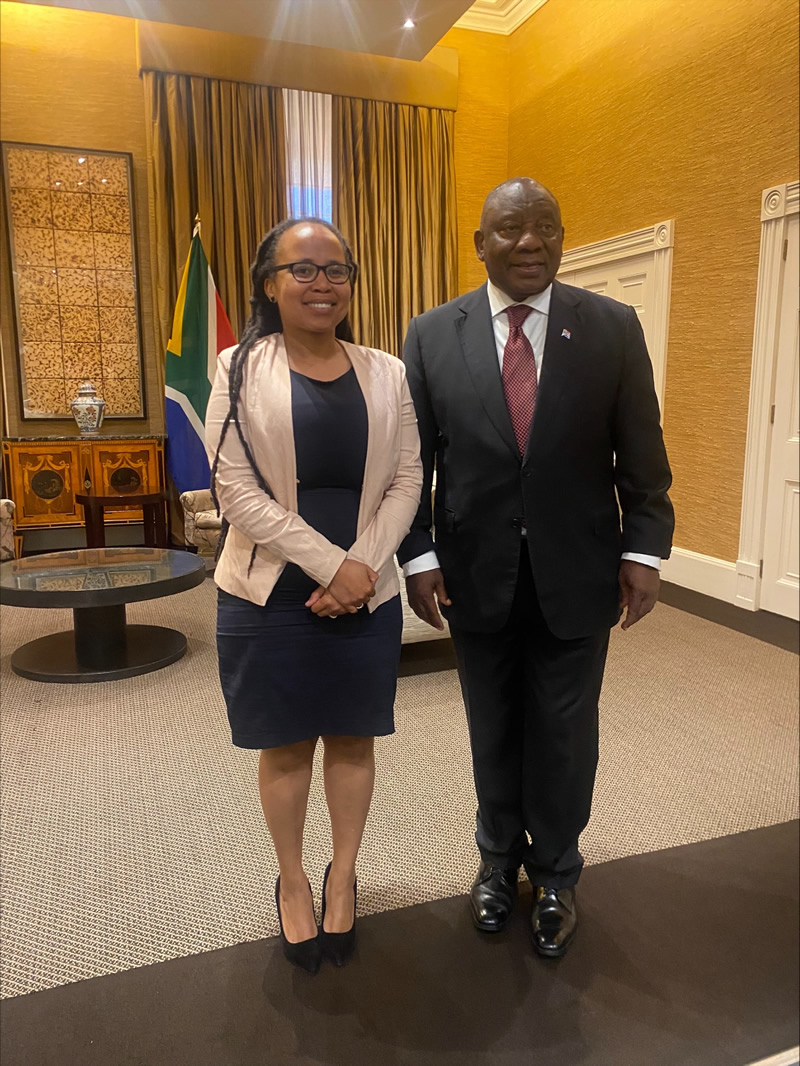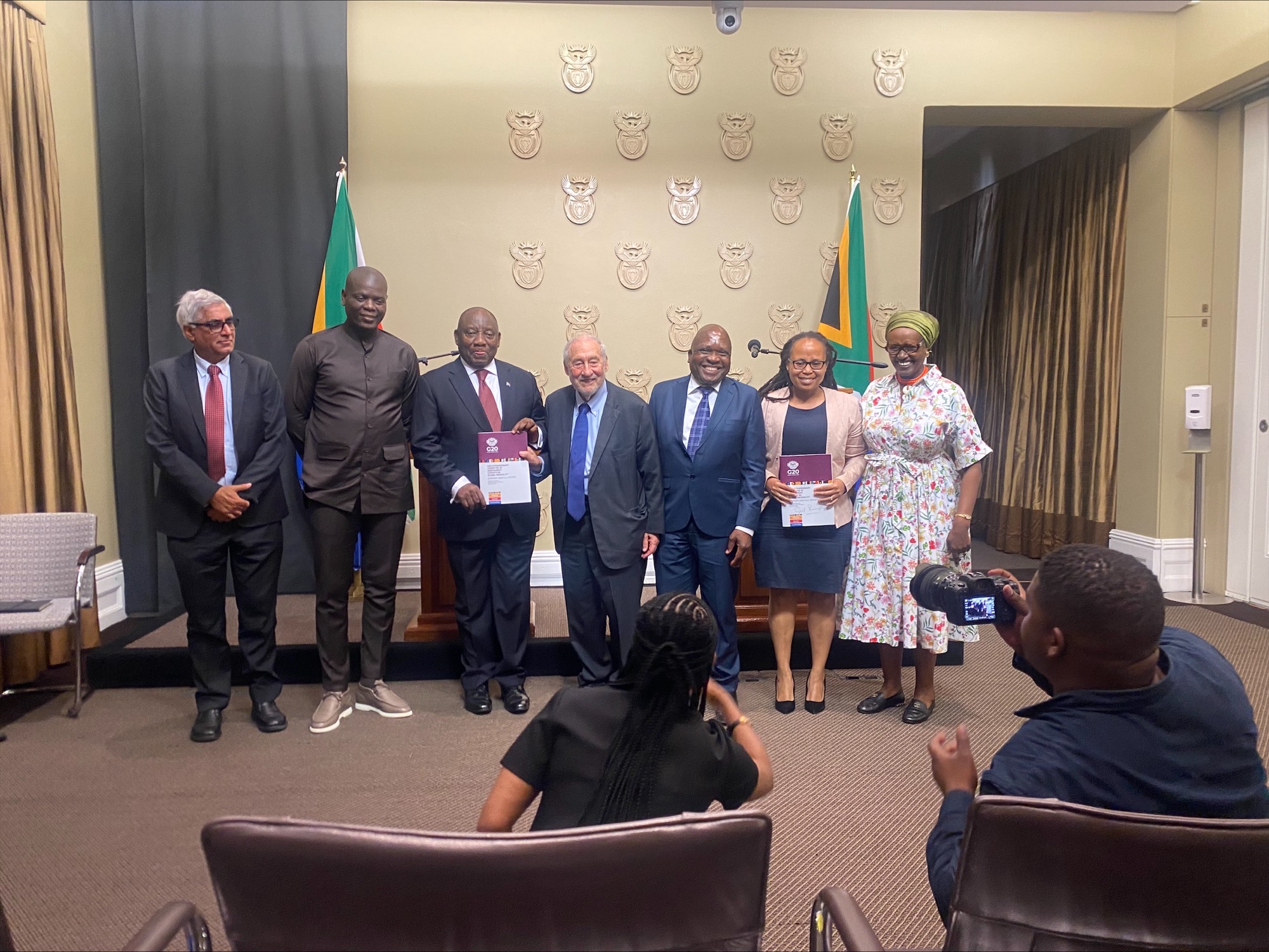- The 'Extraordinary Committee' of independent experts - appointed by President Ramaphosa - launches the G20's first-ever report on global inequality today
- The Committee above all urges the creation of a new 'International Panel on Inequality' to inform policymaking internationally and by governments -inspired by the Intergovernmental Panel on Climate Change (IPCC)
- New analysis published in the report shows that between 2000 and 2024, the world's top 1% captured 41% of all new wealth, while just 1% went to the bottom 50%, amid growing concerns about democratic capture associated with wealth concentration
The "Extraordinary Committee of Independent Experts on Global Inequality" - commissioned by President Cyril Ramaphosa for South Africa's Presidency of the G20 - today unveiled the first-ever report on inequality to the G20. The Committee is chaired by Nobel Prize-winning economist Professor Joseph Stiglitz and joined by five other leading global experts. The report follows consultation with leading economists and inequality experts across the world.
The Committee's key recommendation is the creation of a new international and independent panel - inspired by the Intergovernmental Panel on Climate Change (IPCC) - that would monitor trends and assess its drivers and consequences and evaluate alternative policies for addressing it, to inform governments, policy makers, and the international community.
Their report offers a snapshot of the forces giving rise to inequality and the state of inequality. It comes amid heightening concern about 'the global increase in incomes and wealth at the upper end of the scale' and the increasing challenges large parts of the population face in making ends meet. In analyzing policies that could help to alleviate inequality, the report focuses particularly at the international level, including to rein in corporate concentration and efforts to reform the international tax architecture that are already on the G20 agenda .
Professor Joseph Stiglitz (USA), Nobel laureate in economics
"It is an honor for us to present this report to President Ramaphosa, and to the G20. The available evidence on inequality should concern leaders everywhere. The world understands that we have a climate emergency; it's time we recognize that we face an inequality emergency too. It isn't just urifair and undermining societal cohesion - it's a problem for our economy and our politics too. Our committee felt strongly that some of the worst effects of inequality are on democracy.
"The Committee's work showed us that inequality is a crisis in need of concerted action. The necessary step to taking this action is for policymakers, political leaders, the private sector,journalists and academia to have accurate and timely iriformation and analysis of the inequality crisis. This is why our recommendation above all is for a new International Panel on Inequality. It would learn from the remarkable job the IPCC has done for climate change, bringing together technical expertise worldwide to track inequality and assess what is driving it."
The report reviews and compares the latest data on the state of inequality, revealing:
- 83% of all countries, accounting for 90% of the world's population, meet the World Bank's definition of high inequality. Countries with high inequality are seven times more likely to experience democratic decline than more equal countries.
- The richest 1% captured 41% of new wealth since the year 2000, while the bottom 50% of humanity have increased their wealth by just 196, using data from the World Inequality Lab. This means that the richest 1% have seen their average wealth rise by US$1.3m, while the bottom 50% have seen their wealth rise by just US$585 over the same period, in constant 2024 dollars.
- Inequality between all individuals in the world has fallen in recent decades largely due to income growth in China, but the prospects for further reductions are uncertain. The overall income gap between Global North and Global South countries remains very high
- New data on the major increase in inherited wealth shows $70 trillion of wealth is expected to be handed down to heirs over the coming ten years, a major challenge to social mobility, fairness and equality of opportunity.
The Committee highlights how inequality, particularly in the extremes, has many negative economic, political and societal outcomes, each interacting with the other in ways that exacerbate the adverse effects. High wealth inequality in particular undermines both democracy and economic progress. Recent events since 2020, including COVID-19, the Ukraine war and new tariffs and trade disputes since the beginning of 2025 are creating a 'perfect storm' which is further increasing poverty and inequality. One in four people worldwide now regularly skip meals, whilst billionaire wealth has now hit the highest level in history.
The Report highlights how different policies could help to reduce inequality at the national and international levels, and notes the role that the G20 can play in facilitating global coordination:
- Reforming international economic rules - redesigning intellectual property rules (especially relating to pandemics and climate change), rewriting tax rules to ensure fair taxation of multinationals and the ultra-wealthy (noting the UN Tax Convention).
- National action - that can include exploring the roles of pro-worker regulation, reducing corporate concentration, taxing large capital gains, investing in public services, and more progressive tax and expenditure policies.
- New models for cooperation - especially given current geopolitical volatility, exploring new efforts between countries, for instance on taxes, trade and the green transition.
The six independent experts are Professor Joseph E. Stiglitz (USA); Dr Adriana E. Abdenur (Brazil); Ms Winnie Byanyima (Uganda); Professor Jayati Ghosh (India); Professor lmraan Valodia (South Africa); and Dr Wanga Zembe-Mkabile (South Africa).
Further quotes from members of the G20 Extraordinary Committee
Dr Adriana E. Abdenur (Brazil), Brazilian social scientist, co-founder of Plataforma CIPO
"Inequality is not just a consequence but a cause of our greatest societal challenges. And as our report shows, the rules of the global economy are too often designed in an unequal way. Yet no country can tackle this problem alone. Brazil's presidency of the G20 made crucial steps towards addressing hunger,pharmaceutical monopolies, andfairer taxation of the ultra-wealthy. Now, South Africa is providing leadership to launch an international effort aimed squarely at addressing inequality. It would be a remarkable legacy - a new kind of multilateralism- and all governments should support it."
Ms W'mnie Byanyima (Uganda): Executive Director of UNAIDS
"AIDS is a case study for how inequality prevents humanity from eliminating problems that could be consigned to history. We know how to end AIDS - we have highly effective medicines for treating and preventing HW. Yet, poverty, stigma, and criminalization push people away from services. Intellectual property rules protect monopolies and keep prices high. Tax avoidance by the wealthy and corporations drains health budgets. And the swelling debt burden forces governments to spend more on servicing debt than on the health of their people. Ending AIDS - like so many other global challenges - depends on ending inequality."
Professor Jayati Ghosh (India), Professor, University of Massachusetts at Amherst
"Extreme inequality has generated or added to so many of the major challenges of our times: growing perceptions of injustice, widening polarization and fraying social contracts; excessive power wielded by very few, distorting political, economic and social life; inability to address the causes and consequences of ecological damage and climate change. These outcomes are not inei,itable-they result from institutional architectures, regulatory structures and policy choices that can be reversed, both nationally and internationally. Our report provides a blueprint for such change, whereby reducing inequalities helps to make economies deliver for people and planet."
Professor lmraan Valodia (South Africa): Professor of Economics, Pro Vice-Chancellor: Climate, Sustainability and Inequality, University of the Witwatersrand (WITS)
"Every country has scope to address inequality at the national level, and it is in every country's strategic interest to cooperate internationally.Yet one thing became clear when we were writing our report. While there is a wealth of academic literature about inequality - there is not a single central body that assesses the global state of inequality. Indeed, many estimates seem to have severely underestimated the level of inequality in our societies. Without proper scrutiny, inequality has spiraled out of control - and it's time to get ahold of it."

Dr Wanga Zembe-Mkabile (South Africa): Senior Specialist Scientist, SAMRC, and Professor at the UWC School of Public Health
"It cannot be right that we live in a world where a handful of people can accrue many millions of dollars in a day, while the lowest paid formal and informal workers are barely able to afford rent,feed their children, and give them a good education. I hope that, as governments consider the policy options in this report, they will remember that this is not an abstract argument about the distribution of wealth, but a choice about whether we give children and their families a fair shot at life - or, in some cases, any life at all."
Experts
- Professor Joseph Stiglitz (USA): a Nobel laureate in economics, university professor at Columbia University and chief economist of the Roosevelt Institute.
- Dr Adriana E. Abdenur (Brazil): a Brazilian social scientist, former Special Advisor in International Affairs in the office of President Lula of Brazil, co-founder of the Brazilian think tank Plataforma CIP6, and current co-President of the Global Fund for a New Economy (GFNE).
- Ms Winnie Byanyima (Uganda): Executive Director of UNAIDS and an Under-Secretary General of the United Nations, Convenor of the Global Council on Inequality, AIDS and Pandemics, and co-founder and co-chair of the People's Medicines Alliance
- Professor Jayati Ghosh (India): Professor, University of Massachusetts at Amherst, and Co-Chair, International Commission for the Reform of International Corporate Taxation
- Professor lmraan Valodia (South Africa): Professor of Economics, Pro Vice-Chancellor: Climate, Sustainability and Inequality, and Director of the Southern Centre for Inequality Studies, University of the Witwatersrand (WITS)
- Dr Wanga Zembe-Mkabile (South Africa): Professor at the UWC School of Public Health and Senior Specialist Scientist of the South African Medical Research Council.
The President of South Africa will host a launch of the G20 Extraordinary Committee's report in South Africa on 4 November 2025. At the South Africa 2025 Joburg Summit, the Extraordinary Committee has been formally invited to present the report to the G20's Leaders Meeting.
The G20 "Extraordinary Committee of Independent Experts on Global Inequality" is - as part of the G20 Sherpa Track - a special project located in the G20 Sherpa's Office, in the Department of International Relations and Cooperation (DIRCO) of South Africa.
The G20 comprises 19 countries including: Argentina, Australia, Brazil, Canada, China, France, Germany, India, Indonesia, Italy, Japan, Republic of Korea, Mexico, Russia, Saudi Arabia, South Africa, Tiirkiye, United Kingdom, and United States and two regional bodies, namely the European Union and the African Union.

